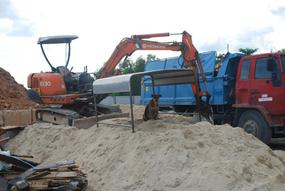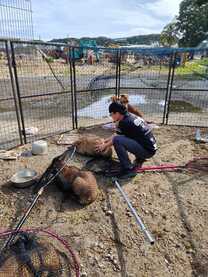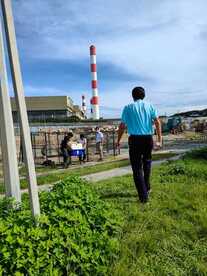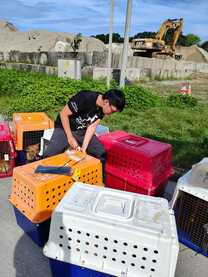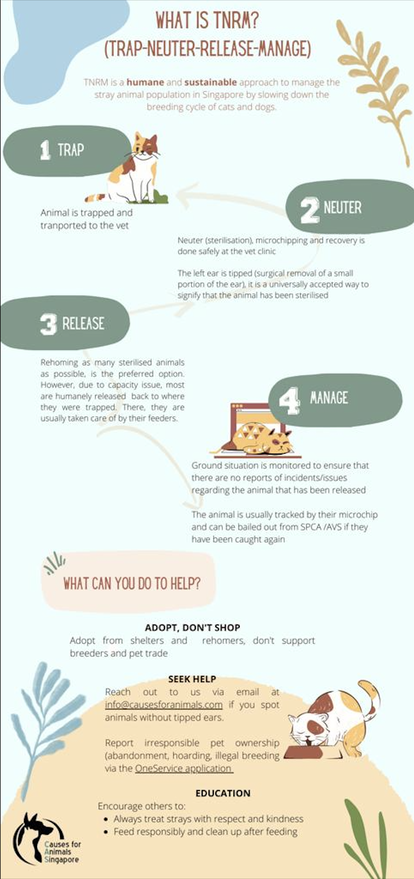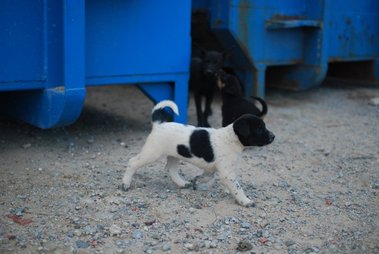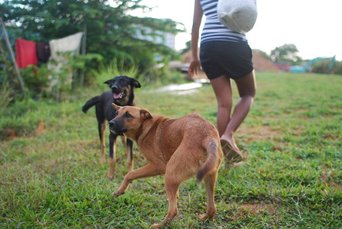STRAY MANAGEMENT PROGRAM
(Trap, Neuter, Release)
(Trap, Neuter, Release)
It has been reported there are over 10000 stray animals in Singapore. |
|
|
STRAY MANAGEMENT PROGRAM
We vaccinate to help prevent dangerous diseases that can kill animals and can be passed onto our own pets. We microchip and record dogs/cats details including photos and location. This helps Animal Welfare Groups track which dogs have been processed We sterilise females first and then the males. We will sterilise every dog in their pack, even the more elusive ones. |
It costs $380 to $450 to process a dog & $200 to process a cat
|
We also run a similar programme for community cats in Singapore. Cats are a common sight in the Singapore neigbourhood and we believe it is possible to live with community cats around us as long as the population is controlled. We help with the sterilisation of cats in HDB Estates, Private Estates and industrial areas too. The main goal is to ensure the population of cats in a certain area is kept contained and not increasing.
Imagine being born to the streets with little food, water or even shelter. To make matters worse, the number of animals around you constantly multiply making life even tougher than it originally was. This is the vicious cycle of life many street animals face without proper population control measures in place.
Singapore embarked on the nationwide TNRM programme for dogs 3 years ago but very little is being done to help with the industrial cats on Singapore. Community cats tend to have it better with lovely aunty's in our heartlands to feed them and aid in the sterilisation process. Sadly, for industrial cats there has been little or no help offered as company's often want the cats out and do not see sterilisation as a potential solution.
We continue to help with trapping and sterilisation of cats but choose to return most cats to the areas they reside in as they have feeders and caregivers who are on the constant look out for them. We simply offer medical aid when necessary . These cats seem happier and more accustomed to their environment and not all cats are suitable for rehoming. It takes $200 to sterilise, microchip and hospitalise a cat. Sometimes more if health issues are present.
Imagine being born to the streets with little food, water or even shelter. To make matters worse, the number of animals around you constantly multiply making life even tougher than it originally was. This is the vicious cycle of life many street animals face without proper population control measures in place.
Singapore embarked on the nationwide TNRM programme for dogs 3 years ago but very little is being done to help with the industrial cats on Singapore. Community cats tend to have it better with lovely aunty's in our heartlands to feed them and aid in the sterilisation process. Sadly, for industrial cats there has been little or no help offered as company's often want the cats out and do not see sterilisation as a potential solution.
We continue to help with trapping and sterilisation of cats but choose to return most cats to the areas they reside in as they have feeders and caregivers who are on the constant look out for them. We simply offer medical aid when necessary . These cats seem happier and more accustomed to their environment and not all cats are suitable for rehoming. It takes $200 to sterilise, microchip and hospitalise a cat. Sometimes more if health issues are present.
Please donate
We are increasing the number of dogs processed to 15 dogs and 100 cats per month through our Stray Management Program. This is partially covered by Government subsidies, and we still need YOUR help to continue doing what we do.
Sponsor every month or a one off donation
Sponsor a one off donation via paypal, credit card (via givin.sg), atm, IB, chq, paynow. You can sponsor every month by paypal, credit card (via giving.sg) or bank standing instruction.
CAS is a registered charity and an Institute of Public Character (IPC) in Singapore. Donations made to us are entitled to tax relief if your Tax Reference Number (NRIC/FIN/UEN) is submitted to us at time of donation. By providing you Tax Reference Number you are consenting to the collection of your personal data for the purposes of processing your donation with CAS. More info.
Sponsor a one off donation via paypal, credit card (via givin.sg), atm, IB, chq, paynow. You can sponsor every month by paypal, credit card (via giving.sg) or bank standing instruction.
CAS is a registered charity and an Institute of Public Character (IPC) in Singapore. Donations made to us are entitled to tax relief if your Tax Reference Number (NRIC/FIN/UEN) is submitted to us at time of donation. By providing you Tax Reference Number you are consenting to the collection of your personal data for the purposes of processing your donation with CAS. More info.
|
One-time donation via Paypal
|
Sponsor every month via paypal
|
|
|
|
Click to set custom HTML
For Paypal donors who do not enter their TRN: the confirmation sent by Paypal will be an acknowledgement of your donation. No CAS e-receipts will be issued.
Removal or killing of stray dogs seems to be the most obvious method of controlling the population, but it has actually proved to be completely useless.
|
This is because even when large numbers of dogs are killed, the conditions that sustain dog populations remain unchanged.
Dogs are territorial and each one lives in its own specific area. When they are removed, the following things happen:
|
Dogs breed at a very high rate (two litters of pups a year). We have estimated that two dogs can multiply to over 300 in three years. |
If you catch a dog to sterilise, why put the dogs back? Doesn't the problem just continue?
|
No, when dogs are sterilised and put back in their own area, the population and the problems caused by dogs both reduce. Here’s how:
|
Management and use of all donations are in keeping with accepted accounting principles and the Charities Act, Singapore guidelines. We are determined to be known for our high ethical standards and our commitment to transparency and openness.

